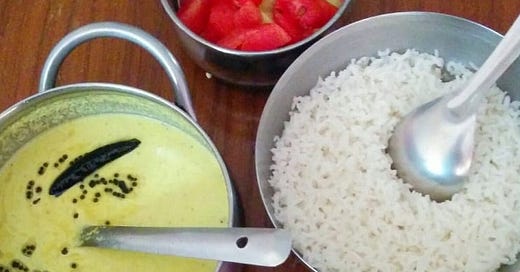My mother and her twin sister were born four minutes apart. Identical.
As babies, K and M were virtually indistinguishable. Photos from their teenage and early twenties require a minute of meditation to make out who is who. Then again, iykyk.
There are several stories of people mistaking one for the other. Classic twin stories.
As a baby, I too apparently fell for this trap when I ran from my own mother’s arms to my aunt who had just returned from work. For much of our lives, my cousins, brother and I have had two moms. Ours also happened to be same-same-but-different: similar looking, distinct personalities but somehow, the same person.
This meant they could shower love and discipline each other’s children without prior permission. For instance, one summer, Chitti forced me to learn the multiplication table of 13. I still don’t know why she picked 13 and why we never went to 14 or started with 12. I was quizzed everyday that summer vacation. A few years later, midway through class 10, on a summer evening she picked A and me from the beach and gifted us an iPod each! She said this was advance congratulations for our excellent marks in the board exams which were at least 8 months away. No pressure, obviously.
There are plenty of perks of having same-same-but-different-two-of-a-kind mothers. For instance, you can surprise one by planning with the other. In my early twenties, I decided my gift to Amma for mother’s day would be a home-cooked meal that included her favorite: morkuzhambu (a south-Indian yogurt-based dish). My brother and her relished it. My father and I were team vethakuzhambu (tamarind-based). As a result, she rarely had the chance to eat it.
Mother’s day falls in May. It is mango season and this meant mambazham morkuzhambu.
The only way I could achieve this was by calling Chitti for help. Once the kitchen was clear and Amma was away, I would ring her up and ask for the recipe, step-by-step. Her instructions were clear and direct. I would listen to her, clarify where needed, keep the phone down. There was no need to write it down. I would remember and execute.
Surprise! It would be a happy mother’s day.
The last time I made it was 2015.
By October 2015, Chitti was sick. In May 2016, Amma was probably with her in Chennai. In September 2016, she was gone.
An excerpt from White Lilies: an essay on grief by Vidya Krishnan:
“My favourite thing she made was rasam. … It is a dish I go to when I am sick, when I am sad or when I want to show off. Now I had lost the recipe and the recipe-keeper, and I'd spend a decade trying to recreate it.”
The arrogance and naivety of youth is a double-edged sword that believes that life is long, bad things only happen to other people, that we have all the time in the world.
Was she the only one who knew how to make it? No. Was she the best at making it? To be honest, I’m now ashamed to admit that I don’t remember her cooking anymore. My Amma or even my (now) go-to websites for recipes will probably just do fine and give the same results. It’s hardly about the recipe and entirely about the recipe-keeper.
There is a custom shape of grief attached to each recipe-keeper, secret-holder, joy-bringer, co-conspirator, joke-teller, cheerleader…




🩷🩷🩷🩷
Sharmada, I know exactly what you mean. I look at the tattered note book which holds my mother’s recipes every day and tell myself that whatever I do I will not recreate that taste.
Make mambazha mor kuzhambu for me one day ! Would love to try it!